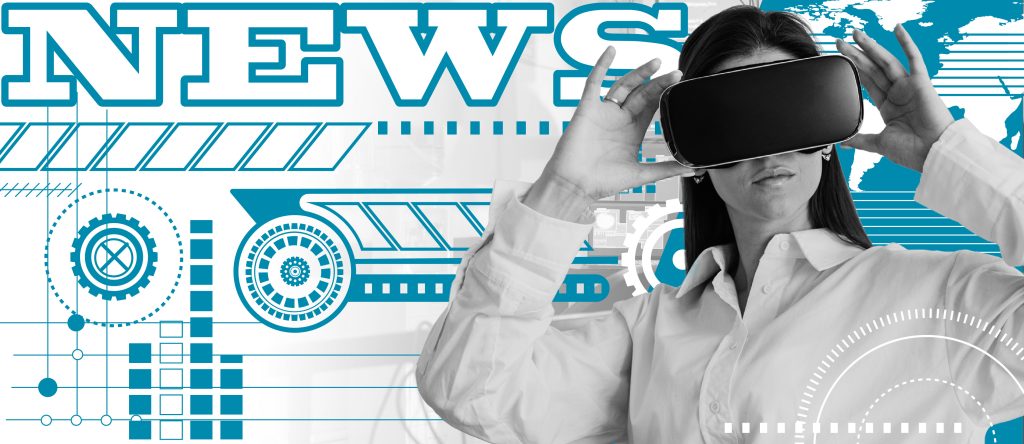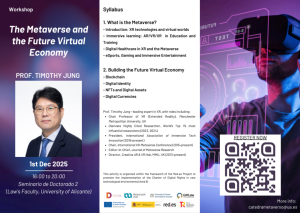
This newsletter edition has been elaborated by Inés Tremiño Guillén and Giovanni Sorrentino
MetaverseUA Chair Newsletter #20 – July 2025
Hey there, Metaversian friends!
This month, we’re taking a little detour from our usual delivery of the latest XR, VR and AR buzz to bring you something a little different—but just as juicy: a recap of II International Congress “A Metaverse for the Good” we organised last month in sunny Alicante!
We took a few days to recover from all the emotions and to gather the best moments from those three days. Summarising everything is no easy task, but we’ll give it a try in this special edition of our newsletter.
From June 11–13, the University of Alicante became the European HQ for immersive innovation as we welcomed academics, techies, policymakers, and pioneers to not one, but TWO powerhouse events exploring the future of AI, the Metaverse, and digital rights.
🚀 First up: The EMRN Conference
The second edition of the European Metaverse Research Network’s conference, “Exploring the Intersection of AI and the Metaverse”, was a full-blown think tank experience. Supported by Red.es and co-organised with the MetaverseUA Chair, we dove deep into the ethical, legal, and social dimensions of emerging XR/AI tech. through the 8 Keynote speeches, 6 thematic sessions, 3 discussion panels and 14 poster presentations. The proceedings of the Congress have already been published, and the recordings will be available during this month. As a summary, we would like to highlight the following conclusions:
- The 8 mind-expanding keynotes speeches – Olaf Blanke, Yvonne Rogers, Frank Steinicke, Patrick Haggard, Mavi Sánchez-Vives, Doron Friedman and Miguel Barreda Ángeles— covered everything from the neuroscience of self-consciousness to digital touch ethics. Immersive technologies are evolving very fast, but there are still health concerns, ethical questions and legal concerns that need to be addressed so that the Metaverse benefits society at large.
- Poster presentations took us from sustainable living on Mars 👽 to neurorehabilitation in your living room. Topics ranged from AI-powered crime investigations in the Metaverse, gender-based harassment and virtual embodiment, to precision agriculture training in VR and copyright conundrums of user-generated content. Yes, the future is wild—and wickedly interdisciplinary!
- The panel sessions aimed to tackle some tough questions: “Are virtual humans friends or ethical minefields?”, “How do we design an AI-powered society without losing trust and autonomy?”, and “What happens when mental health therapy goes fully virtual?”.
Discussions held in the sessions raise awareness on the need to carry out interdisciplinary research. As an example, in Session 3 «Clinical and well-being applications of the Metaverse”, three projects on the use of XR/AR applications for therapeutic purposes were presented. The fact that such initiatives may require the recognition of emotions and the use of personal data calls for the involvement of legal experts to ensure compliance with the current legal framework.
Further conclusions included:
- Virtual actions carry moral responsibility, both from the perspective of the agent’s moral development and the potential moral harm to others. This raises the question of whether virtual behavior should have material or digital consequences.
- AI and VR tools designed to «slow down» thinking can help reduce cognitive bias and promote self-reflection, improving decision-making and emotional wellbeing.
- Empathy-building VR experiences have shown great potential over the past decade but face decreasing engagement due to high costs, limited interactivity, and emotional fatigue among audiences.
- Trust and governance in Web 4.0 and virtual worlds remain critical. Strong policy coordination, diverse stakeholder involvement, and clear regulatory frameworks are needed to ensure human rights and user protection in future digital ecosystems.
- In AI-driven healthcare applications, concerns around data privacy, clinical validation, equitable access, and regulatory oversight must be addressed to ensure safe and effective deployment of immersive technologies.

June 13 brought a whole new vibe with the EspañaXR – Immersive Tech, Entrepreneurship & Public Policy Congress. Unlike anything before, this event zoomed in on how immersive technologies and virtual worlds can reshape both business innovation and public governance.
🎯 The goal? To reflect on how XR technologies can unlock new business models and support the development of public policies across diverse sectors—from healthcare 🏥 to urban planning 🏗️. And at the same time, to examine how these technologies intersect with key digital rights, including accessibility, privacy, participation, and equal opportunity in virtual environments.
📍 Hosted at the University of Alicante’s Faculty of Law, the program featured three lively roundtables:
- Using XR to drive public policies, with speakers from LabLENI (UPV), Cibernos, and Universidad de Alicante, highlighting immersive applications in architecture, citizen services, and education.
- Immersive tech in industry, where representatives from Universidad de Alicante, Vicomtech, and Xperiencia Virtual shared real-world XR use cases in smart industry and process optimization.
- Designing virtual worlds, a creative clash of visionaries from Immersive Oasis, and Nokia XR Lab on crafting meaningful digital experiences.
These discussions also brought forward some key conclusions:
- Current XR platforms still face low interoperability, both in terms of access and asset integration, limiting scalability and user fluidity across virtual environments.
- On the positive side, VR-based robotics training platforms were highlighted as powerful tools for simulating real industrial processes, proving especially valuable for educational and professional training contexts.
🍒 And as the cherry on top, we unveiled the first results of public consultation we published, working together with Inmersiva XR, on immersive tech and virtual worlds—and let’s just say, the findings are both fascinating and eye-opening:
- 71% of general respondents have tried immersive tech, but only 50% have ventured into virtual worlds.
- Entertainment (88%), education (69%), and virtual workspaces (48%) are seen as the top impact areas.
- But concerns are real: affordability (56%), privacy (54%), and mental/physical health risks (54%) top the list of worries.
- From industry professionals: internal training (74%) and product development (72%) are the hottest XR applications.
- And when it comes to regulation… let’s just say it’s complicated—only 9% think current laws are fully up to speed!
👉 Want the full scoop? Stay tuned—our full synthesis report will be dropping soon.
📌 Whether you joined us in person or are catching up now, we’re grateful to be shaping the future of immersive reality together. But above all, it is incredibly rewarding to see how much the community has grown over the past two years. If last year’s mission was to bring together legal experts in the field—mostly from academia—this year the goal was to expand to other academic disciplines and to engage with the industry. And once again, we can proudly say: mission accomplished!
The metaverse is evolving—fast—and so are we.
Catch you in the next (more tech-newsy) edition!
Inés Tremiño Guillén and Giovanni Sorrentino
Inés Tremiño Guillén and Giovanni Sorrentino





